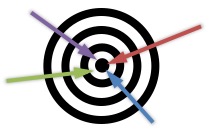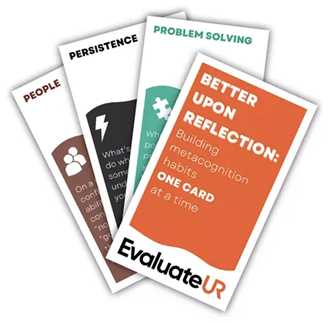by Patrick Cunningham, Ph.D., Rose-Hulman Institute of Technology
We know that students’ prior subject knowledge impacts their learning in our courses. Many instructors even give prior knowledge assessments at the start of a term and use the results to tailor their instruction. But have you ever considered the impact of students’ prior knowledge and experiences with learning on their approaches to learning in your course? It is important for us to recognize that our students are individuals with different expectations and learning preferences. Encouraging our students’ metacognitive awareness and growth can empower them to target their own learning needs and establish common aims for learning.

Among other things, our students often come to us with having experienced academic success using memorization and pattern matching approaches to material, i.e., rehearsal strategies. Because they have practiced these approaches over time and have gotten good grades in prior courses or academic levels, these strategies are firmly fixed in their learning repertoire and are their go-to strategies. Further, when they get stressed academically, they spend more time employing these strategies – they want more examples, they re-read and highlight notes, they “go-over” solutions to old exams, they memorize equations for special cases, and more. And many of us did too, when we were in their shoes.
However, rehearsal strategies only result in shorter-term memory of concepts and surface-level understanding. In order to build more durable memory of concepts and deeper understanding, more effortful strategies are needed. Recognizing this and doing something about it is metacognitive activity – knowing about how we process information and making intentional choices to regulate our learning and learning approaches. One way to engage students in building such metacognitive self-awareness and set common expectations for learning in your course starts with a simple question,
‘What does it mean to learn something?”
I often ask this at the start of a course. In an earlier post, Helping Students Feel Responsible for Their Learning, I introduced students’ common responses. Learning something, they say, means being able to apply it or explain it. With some further prompting we get to applying concepts to real situations and explaining material to a range of people, from family member to bosses, to cross-functional design teams. These are great operational definitions of learning, and I affirm my students for coming up with them.
Then I go a step further, explaining how transferring to new applications and explaining to a wide range of audiences requires a richly interconnected knowledge framework. For our knowledge to be useful and available, it must be integrated with what we already know.
So, I tell my students, in this class we will be engaging in activities to connect and organize our knowledge. I also try to prepare my students for doing this, acknowledging it will likely be different than what they are used to. In my engineering courses students love to see and work more and more example problems – i.e., rehearsal. Examples are good to a point, particularly as you engage a new topic, but we should be moving beyond just working and referencing examples as we progress in our learning. Engaging in this discussion about learning helps make my intentions clear.
I let my students know that as we engage with the material differently it will feel effortful, even hard at times. For example, I ask my students to come up with and explore variations on an example after we have solved it. A good extension is to have pairs working different variations explain their work to each other. Other times I provide a solution with errors and ask students to find them and take turns explaining their thinking to a neighbor. In this effortful processing, they are building connections. My aim is to grow my students’ metacognitive knowledge by expanding their repertoire of learning strategies and lowering the ‘activation energy’ to using these strategies on their own. It is difficult to try something new when there is so much history behind our habitual approaches.
Another reason I like this opening discussion, is that it welcomes opportunities for metacognitive dialogue and ongoing conversations about metacognition. I have been known to stop class for a “meta-moment” where we take time to become collectively more self-aware, recognizing growth or monitoring our level of understanding. The discussion about what it means to learn something also sets a new foundation and changes conversations about exam, quiz, and homework preparations and performance. You might ask, “How did you know you knew the material?” Instead of suggesting “working harder” or “studying more”, we can talk meaningfully about the context and choices and how effective or ineffective they were.
Such metacognitive self-examination can be challenging for students and even a little uncomfortable, especially if they exhibit more of a fixed mindset toward learning. It may challenge their sense of self, their identity. It is vital to recognize this. Some students may exhibit resistance to the conversation or to the active and constructive pedagogies you employ. Such resistance is challenging, and we must be careful with our responses. Depersonalizing the conversation by focusing on the context and choices can make it feel less threatening. For example, if a student only studied the night or two before an exam, instead of thinking they are lazy or don’t care about learning, we can acknowledge the challenge of managing competing priorities and ask them what they could choose to do differently next time. We need to be careful not to assume too much, e.g., a student is lazy. Questions can help us understand our students better and promote student self-awareness. For more on this approach to addressing student resistance see my post on Addressing Student Resistance to Engaging in their Metacognitive Development.
Students’ prior learning experiences impact how they approach learning in specific courses. Engaging students early in a metacognitive discussion can help develop a common set of expectations for learning in your course, clarifying your intentions. It also can open doors for metacognitive dialogue with our students; one-on-one, in groups, or as a class. It welcomes metacognition as a relevant topic into the course. However, as we engage in these discussions, we must be sensitive to our students, respectfully and gently nudging their metacognitive growth. Remember, this is hard work and it was (and often still is) hard for us too!
Acknowledgements This blog post is based upon metacognition research supported by the National Science Foundation under Grant Nos. 1433757 & 1433645. Any opinions, findings, and conclusions or recommendations expressed in this material are those of the author and do not necessarily reflect the views of the National Science Foundation.



